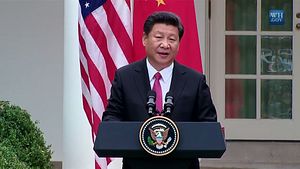Anyone observing the cacophonous declarations of fervor for Republican Party presidential nominee Donald Trump at the Cleveland convention in late July would have been safe in making one conclusion: we live in an era in which “elites” is a dirty word. From Trump in the United States and Brexit in the U.K. to the real possibility that France might see a National Front Le Pen presidency next year, elites have never been more loathed and targeted by coruscating anger and criticism from figures standing for power.
China might seem shielded from this. The Communist Party after all on one level can be seen as the ultimate self-protecting elite. It doesn’t expose itself to the threat of open ended elections that might dislodge it from power. At its uppermost levels, within the Central Committee and Politburo, it has the most tightly defined, entrenched body of people able to control the core levers of power as anywhere on earth. And on the surface, at least, in recent years this has been compounded by the way it seems to be led by what looks increasingly like a Party aristocracy. Xi Jinping, we are constantly told, is a princeling, related to a former generation of high level leaders. Surely this means he is one of the elite?
Under the surface, however, Xi has more in common with the aspiring anti-elitist usurpers elsewhere in the world than initial impressions might indicate. In some ways, he shares a little of the anti-intellectualism and practice of politics based on appeal to visceral emotions rather than logic that is espoused by figures like Trump and Le Pen. The only issue is that the one party system he has risen through has concealed from public view a lot of the competitive grandstanding and open declaration of these positions that would have been necessary in a multi-party environment.
First up, there is this issue of Xi being a member of the elite. It is true his father, Xi Zhongxun, was a political and military leader. But he was hardly in the first rank in the Maoist era, particularly as he was under house arrest for almost two decades. At best, one can say that Xi belongs to the elite second league. He was certainly not a member of an A-grade family like the felled Bo Xilai, whose father was securely lodged as one of the so called “eight immortals.” And as time goes on, his decapitation of Bo’s ambitions – perhaps the only leader who might have made a good effort at cramping Xi’s political ascent – grows more portentously meaningful. In one fell move, Xi scuttled the ambitions of a group of people who felt ultimate power was theirs by right.
The simple fact is that since being elevated in late 2012, Xi has comported himself as an almost anti-elitist figure. The grand old establishment families – the Dengs, the Jiangs, those around Li Peng, and further back to the Bos – have had a tough time in the last few years. Their business interests have been eroded. The areas of the state-owned enterprises they had almost made into personal fiefdoms have been clawed back. The anti-corruption struggle has tamed them. For princelings, the Xi era has been harsh. It is truly striking that someone from a largely marginal family tribe could have affected such a hostile takeover of the majestic might of the Communist Party from its usual super elite networks. It is almost as though he were the Trojan horse for a side of the Party that knew it could only rough up the elite if it chose someone who looked like them to get through the door, and once they were in, started to reveal their real colors.
Secondly, for all the appalled criticism and fear of some of these super elite under attack from the new usurper, Xi’s appeal extends beyond the walls of the Party and its inner sanctum to the broad mass of the people. There, his nationalism, insistence on Party serving society, and support for a better deal for the emerging middle class are, from what anyone can see, popular and populist. The people that really complain about him are the intellectuals or sophisticated officials, who regard him as brutal, ill educated, and rough. Such criticisms won’t be heard much in the wider society, where people on the whole like the look of a president who strides around the world, denounces foreign interference in China’s maritime backyard, and generally reassures everyone that he is in charge and knows what he is doing.
Thirdly, like populist leaders elsewhere in this anti-elite, anti-globalist time, Xi has positioned himself as someone who is getting a good deal for China on its own terms. Those comments he was overhead making back in Mexico City in 2010, about “foreigners with full stomachs with nothing better to do than complain about China,” were profoundly revealing about his view of the outside world. It indicated as much a sense of anger about globalization that didn’t work in China’s favor as some of the much more prolific and incendiary rhetoric from Trump. Like Trump, he is going to make his country “great again” – only this time, the hiatus since its last fabled period of true global dominance was not a few years, but centuries.
We need to be wary of slicing China off from political developments in the rest of the world. The simple fact is that Xi shows all the attributes of an anti-elitist, populist leader who is shaking up the political organization he is running to the shock of many of its members. Should Donald Trump succeed in getting elected this November, it is likely that he will get on with Xi Jinping surprisingly well, because in different ways, and through different means, their style of politics is responding to the same issues and using very similar means. No wonder so many Chinese seem fascinated, and almost half admiring, of the American anti-elitist, populist usurper.

































